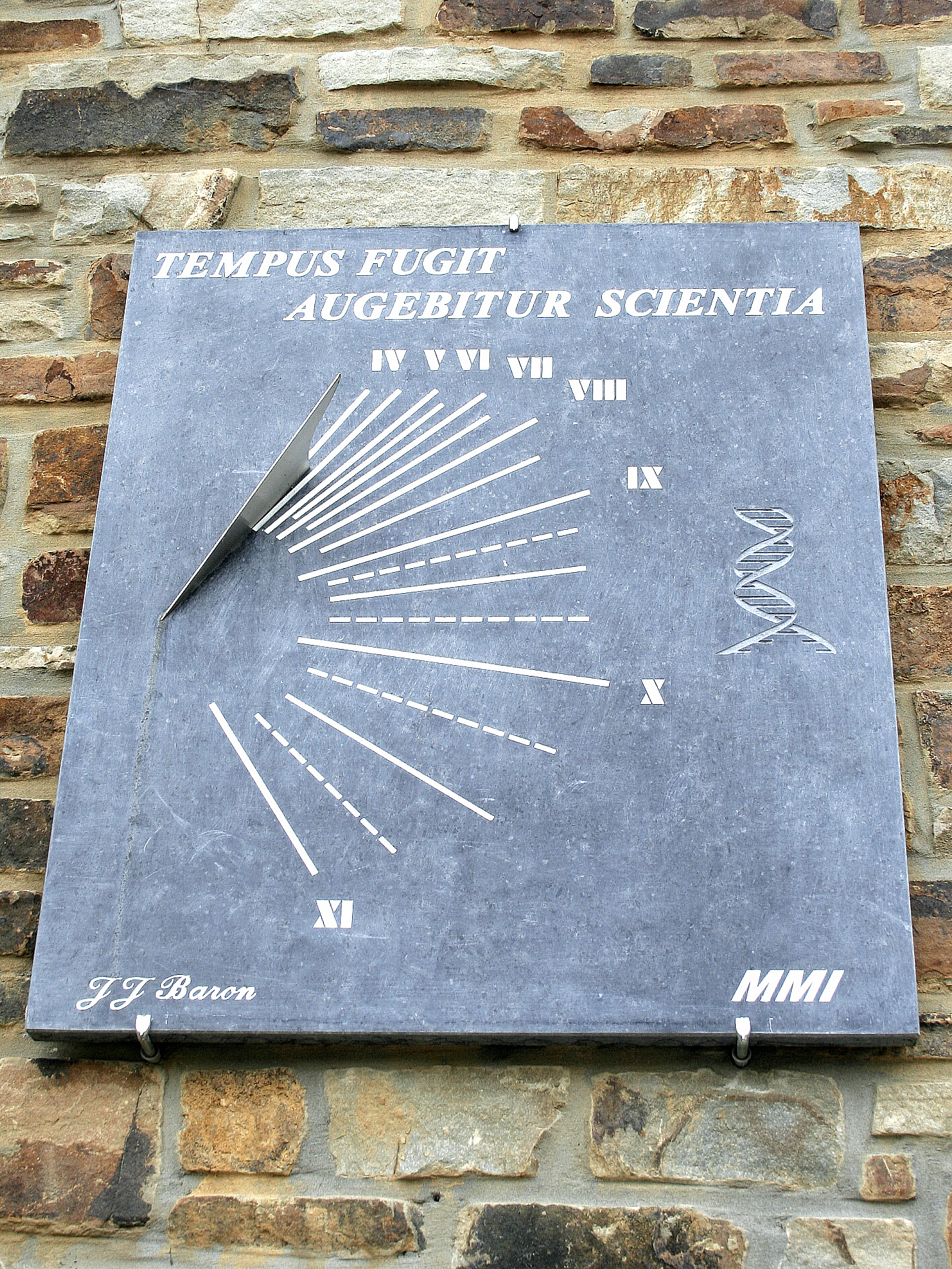Tempus Fugit(short) on:
[Wikipedia]
[Google]
[Amazon]
 ''Tempus fugit'' () is a Latin phrase, usually translated into English as "time flies". The expression comes from line 284 of book 3 of
''Tempus fugit'' () is a Latin phrase, usually translated into English as "time flies". The expression comes from line 284 of book 3 of
 ''Tempus fugit'' is typically employed as an admonition against sloth and procrastination (cf. ''
''Tempus fugit'' is typically employed as an admonition against sloth and procrastination (cf. ''
 ''Tempus fugit'' () is a Latin phrase, usually translated into English as "time flies". The expression comes from line 284 of book 3 of
''Tempus fugit'' () is a Latin phrase, usually translated into English as "time flies". The expression comes from line 284 of book 3 of Virgil
Publius Vergilius Maro (; 15 October 70 BC21 September 19 BC), usually called Virgil or Vergil ( ) in English, was an ancient Rome, ancient Roman poet of the Augustan literature (ancient Rome), Augustan period. He composed three of the most fa ...
's ''Georgics
The ''Georgics'' ( ; ) is a poem by Latin poet Virgil, likely published in 29 BCE. As the name suggests (from the Greek language, Greek word , ''geōrgiká'', i.e. "agricultural hings) the subject of the poem is agriculture; but far from bei ...
'', Vergilius Maro, Publius. ''Georgicon'', III. c. 29 BC. Hosted at Wikisource
Wikisource is an online wiki-based digital library of free-content source text, textual sources operated by the Wikimedia Foundation. Wikisource is the name of the project as a whole; it is also the name for each instance of that project, one f ...
. where it appears as ''fugit'' ''irreparabile'' ''tempus'': "it escapes, irretrievable time". The phrase is used in both its Latin and English forms as a proverb
A proverb (from ) or an adage is a simple, traditional saying that expresses a perceived truth based on common sense or experience. Proverbs are often metaphorical and are an example of formulaic speech, formulaic language. A proverbial phrase ...
that "time's a-wasting".
Usage
 ''Tempus fugit'' is typically employed as an admonition against sloth and procrastination (cf. ''
''Tempus fugit'' is typically employed as an admonition against sloth and procrastination (cf. ''carpe diem
() is a Latin aphorism, usually translated "seize the day", taken from book 1 of the Roman poet Horace's work '' Odes'' (23 BC).
Translation
is the second-person singular present active imperative of '' carpō'' "pick or pluck" used by Ho ...
'') rather than an argument for licentiousness (cf. " gather ye rosebuds while ye may"); the English form is often merely descriptive: "time flies like the wind", "time flies when you're having fun".
The phrase is a common motto
A motto (derived from the Latin language, Latin , 'mutter', by way of Italian language, Italian , 'word' or 'sentence') is a Sentence (linguistics), sentence or phrase expressing a belief or purpose, or the general motivation or intention of a ...
, particularly on sundials and clocks. It also has been used on gravestones
A gravestone or tombstone is a marker, usually stone, that is placed over a grave. A marker set at the head of the grave may be called a headstone. An especially old or elaborate stone slab may be called a funeral stele, stela, or slab. The us ...
.
Some writers have attempted rebuttals: "Time goes, you say? Ah, no! alas, time stays, we go." by Henry Austin Dobson (1840–1921)."Hêd Amser! / Meddi Na! / Erys Amser / Dyn Â" on sundial at Univ of Bangor, North Wales. says the sundial was commissioned by Sir William Henry Preece, and offers an English equivalent: "Time flies, thou sayest – Nay! Man flies; Time still doth stay." Another English version is: "Time Flies, Say Not So: Time Remains,'Tis Man Must Go."
Bud Powell
Earl Rudolph "Bud" Powell (September 27, 1924 – July 31, 1966) was an American jazz pianist and composer. A pioneer in the development of bebop and its associated contributions to jazz theory,Grove Powell's application of complex phrasing to ...
's composition "Tempus Fugue-it
"Tempus Fugue-it" (also known as "Tempus Fugit") is a 1949 jazz composition by jazz pianist Bud Powell (1924–1966). It has been recorded by Powell, Miles Davis and many others.
The song is not actually a fugue in compositional form; its title ...
" is a pun on the phrase.
In the ''Georgics''
The phrase's full appearance in Virgil's ''Georgics'' is:See also
* Time flies like an arrow; fruit flies like a banana * ''Ars longa, vita brevis
is a Latin translation of an aphorism coming originally from Greek. It roughly translates to "skillfulness takes time and life is short".
The aphorism quotes the first two lines of the Aphorisms by the ancient Greek
Ancient Greek ( ...
''
* ''Carpe diem
() is a Latin aphorism, usually translated "seize the day", taken from book 1 of the Roman poet Horace's work '' Odes'' (23 BC).
Translation
is the second-person singular present active imperative of '' carpō'' "pick or pluck" used by Ho ...
''
* '' Got a Lot o' Livin' to Do!'', sung by Elvis Presley
Elvis Aaron Presley (January 8, 1935 – August 16, 1977) was an American singer and actor. Referred to as the "King of Rock and Roll", he is regarded as Cultural impact of Elvis Presley, one of the most significant cultural figures of the ...
, in which "times a wasting" appears as a lyric.
* ''Memento mori
(Latin for "remember (that you have) to die")
''
References
External links
* {{Virgil Latin mottos Latin words and phrases Time management Virgil